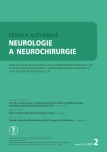Experience with the treatment of cryptococcal meningitis
Authors:
J. Chmelař 1,2; L.siráková 2; P. Šmahel 1,2; Š. Rumlarová 1,2; S. Plíšek 1; R. Chlíbek 2
; J. Smetana 2
Authors‘ workplace:
Klinika infekčních nemocí LF UK a FN Hradec Králové
1; Katedra epidemiologie, Hradec Králové, Fakulta vojenského zdravotnictví Univerzity obrany v Brně
2
Published in:
Cesk Slov Neurol N 2022; 85(2): 189-190
Category:
Letters to Editor
doi:
https://doi.org/10.48095/cccsnn2022189
Sources
1. Beneš J (ed). Kryptokokóza. In: Infekční lékařství. Praha: Galén 2009 : 315.
2. Iyer KR, Revie NM, Fu C et al. Treatment strategies for cryptococcal infection: challenges, advances and future outlook. Nat Rev Microbiol 2021; 8 : 1–13. doi: 10.1038/ s41579-021-00511-0.
3. Guess TE,Rosen J, Lopez NC et al. An inherent T cell deficit in healthy males to C. neoformans infection may begin to explain the sex incidenceof cryptococcosis. Biol Sex Differ 2019; 10 : 44. doi: 10.1186/ s13293-019-0258-2.
4. Rajasingham R, Smith RM, Park BJ et al. Global burden of disease of HIV-associated cryptococcal meningitis: an update analysis. Lancet Infect Dis 2017; 17(8): 873–881. doi: 10.1016/ S1473-3099(17)30243-8.
5. Rozsypal H, Systémová antimykotika. Klin Farmakol Farm 2008; 22(1): 40–44.
6. Perfect JR, Dismukes WE, Dromer F et al. Clinical Practices guidelinesfor the managementof cryptoccocal disease: 2010 update by the Infectious Diseases Society of America. Clin Infect Dis 2010; 50(3): 291–322. doi: 10.1086/ 649858.
Labels
Paediatric neurology Neurosurgery NeurologyArticle was published in
Czech and Slovak Neurology and Neurosurgery

2022 Issue 2
- Memantine Eases Daily Life for Patients and Caregivers
- Possibilities of Using Metamizole in the Treatment of Acute Primary Headaches
- Metamizole at a Glance and in Practice – Effective Non-Opioid Analgesic for All Ages
- Memantine in Dementia Therapy – Current Findings and Possible Future Applications
- Advances in the Treatment of Myasthenia Gravis on the Horizon
-
All articles in this issue
- Historical scope of the swallowing postures and maneuvers in the behavioral treatment of oropharyngeal dysphagia
- Optic nerve infiltration by large B-cell lymphoma
- Successful nonsurgical management of lumbar radiculopathy associated with disc herniation and instability in low back pain syndrome
- Z histórie Slovenskej neurologickej spoločnosti Slovenskej lekárskej spoločnosti
- Music therapy in voice and speech disorders in patients with Parkinson‘s disease
- Targeted surgery for obstructive sleep apnea
- Somatosensory temporal discrimination threshold does not discriminate between patients with essential and dystonic head tremor
- Experience with the treatment of cryptococcal meningitis
- Myositis with anti-NXP2 antibodies
- Bilateral amaurosis as a rare complication of an obstructive hydrocephalus
- The effect of computerized cognitive training on the improvement of cognitive functions of cognitively healthy elderly
- Balance disorders in patients with multiple sclerosis and possible rehabilitation therapy – current findings from controlled clinical trials
- The role of cell adhesion molecules (ICAM-1 and VCAM-1) in acute ischemic stroke
- Successful mechanical thrombectomy of the left superior cerebellar artery
- Ventricular subependymoma with intratumoral haemorrhage mimicking haemocephalus due to aneurysm rupture
- Czech and Slovak Neurology and Neurosurgery
- Journal archive
- Current issue
- About the journal
Most read in this issue
- Targeted surgery for obstructive sleep apnea
- Balance disorders in patients with multiple sclerosis and possible rehabilitation therapy – current findings from controlled clinical trials
- Successful nonsurgical management of lumbar radiculopathy associated with disc herniation and instability in low back pain syndrome
- Music therapy in voice and speech disorders in patients with Parkinson‘s disease
